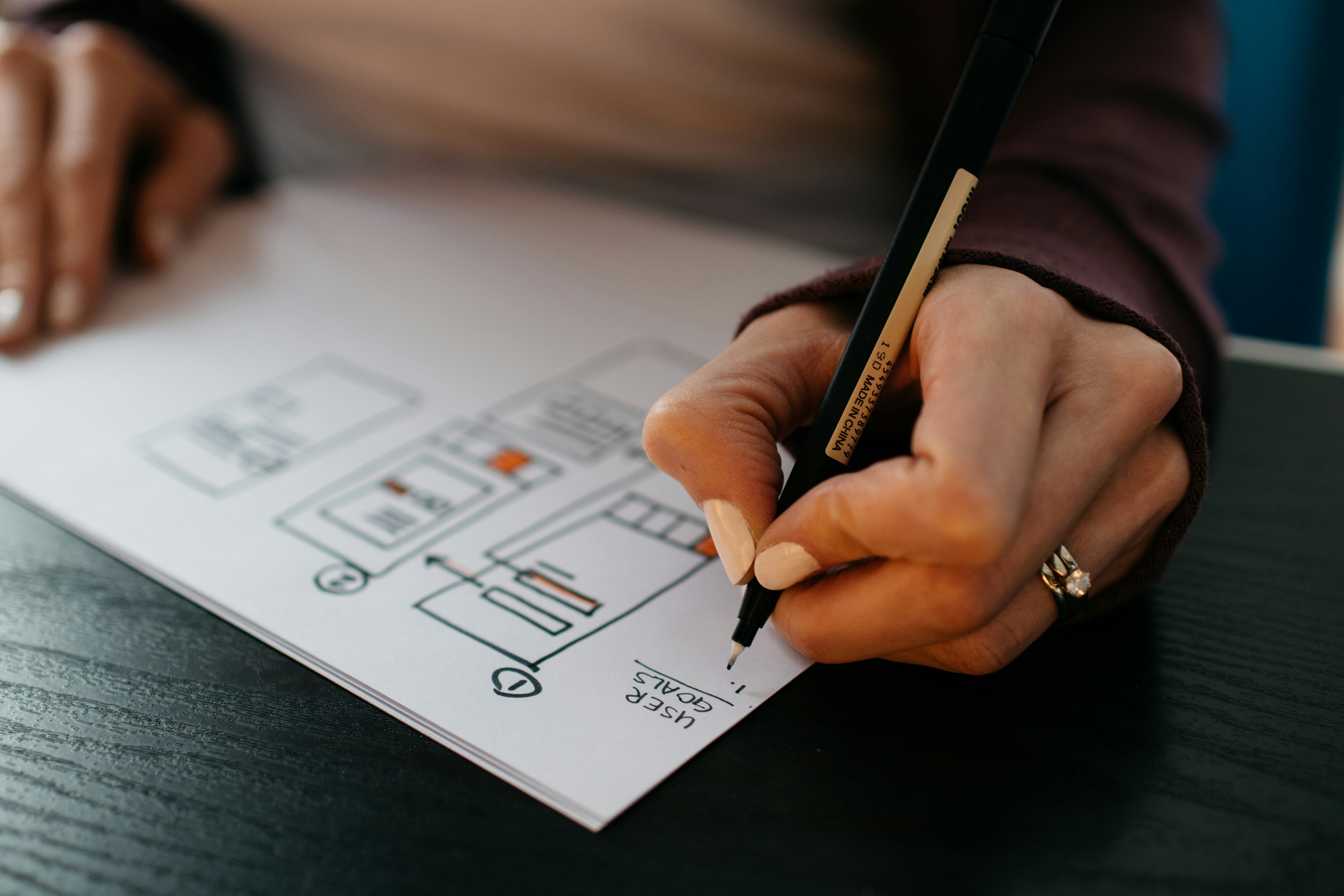Do You Need a Designer to Design Your Website?
Jan 1, 2024
Do You Need a Designer to Design Your Website?
Jan 1, 2024
Do You Need a Designer to Design Your Website?
Jan 1, 2024



In the digital age, having a strong online presence is essential for businesses and individuals alike. Your website is often the first point of contact between you and your audience, making it crucial to make a positive impression. But the question arises: Do you need a designer to craft your website, or can you manage without one?
Let's delve into this debate and explore the pros and cons.
The Case for Hiring a Designer:
Professionalism and Credibility: A well-designed website exudes professionalism and credibility. Designers understand how to create visually appealing layouts, select appropriate color schemes, and incorporate intuitive navigation, enhancing the user experience and fostering trust with visitors.
Customization and Uniqueness: Designers have the expertise to tailor your website according to your brand identity and specific requirements. They can create custom graphics, unique layouts, and personalized elements that set your site apart from competitors and reflect your brand's personality.
Optimization for Performance and SEO: Designers are well-versed in optimizing websites for performance and search engine optimization (SEO). They ensure your site loads quickly, is mobile-responsive, and follows best practices for SEO, improving its visibility and ranking on search engine results pages.
Technical Expertise: Building a website involves technical aspects like coding, responsive design, and compatibility across different browsers and devices. Designers possess the technical know-how to address these challenges effectively, ensuring your site functions seamlessly across platforms.
Time and Efficiency: While DIY website builders offer convenience, designing a website from scratch can be time-consuming, especially if you lack design experience. Hiring a designer allows you to focus on your core business activities while leaving the website development in capable hands.
The Case for DIY Website Builders:
Cost-Effectiveness: One of the primary advantages of DIY website builders is their affordability. Many platforms offer free or low-cost templates and tools that enable individuals and small businesses to create functional websites without breaking the bank.
User-Friendly Interfaces: DIY website builders typically feature intuitive, drag-and-drop interfaces that require minimal technical skills. This accessibility empowers individuals with little to no design experience to create professional-looking websites independently.
Flexibility and Control: With DIY website builders, you have complete control over the design and content of your site. You can experiment with different layouts, colors, and features, making adjustments in real-time to align with your vision and goals.
Quick Deployment: DIY website builders streamline the website development process, allowing you to launch your site quickly. Pre-designed templates and customizable themes expedite the setup process, enabling you to establish an online presence in a matter of hours or days.
Learning and Empowerment: Building your website can be a rewarding learning experience. DIY website builders provide opportunities for self-education and skill development, empowering you to take ownership of your online presence and make ongoing improvements to your site.
Conclusion:
Ultimately, whether you need a designer to design your website depends on various factors such as your budget, design preferences, technical expertise, and time constraints. While hiring a designer offers benefits like professionalism, customization, and optimization, DIY website builders provide cost-effectiveness, flexibility, and control.
For individuals and businesses with limited resources and straightforward design needs, DIY website builders can be a viable option. However, for those seeking a polished, tailored online presence that reflects their brand identity and maximizes performance, investing in a professional designer may be the way to go.
In the end, the key is to assess your priorities, evaluate your options, and choose the approach that best aligns with your goals and objectives. Whether you opt for professional assistance or tackle the design process yourself, the goal remains the same: to create a compelling, engaging website that leaves a lasting impression on your audience.
In the digital age, having a strong online presence is essential for businesses and individuals alike. Your website is often the first point of contact between you and your audience, making it crucial to make a positive impression. But the question arises: Do you need a designer to craft your website, or can you manage without one?
Let's delve into this debate and explore the pros and cons.
The Case for Hiring a Designer:
Professionalism and Credibility: A well-designed website exudes professionalism and credibility. Designers understand how to create visually appealing layouts, select appropriate color schemes, and incorporate intuitive navigation, enhancing the user experience and fostering trust with visitors.
Customization and Uniqueness: Designers have the expertise to tailor your website according to your brand identity and specific requirements. They can create custom graphics, unique layouts, and personalized elements that set your site apart from competitors and reflect your brand's personality.
Optimization for Performance and SEO: Designers are well-versed in optimizing websites for performance and search engine optimization (SEO). They ensure your site loads quickly, is mobile-responsive, and follows best practices for SEO, improving its visibility and ranking on search engine results pages.
Technical Expertise: Building a website involves technical aspects like coding, responsive design, and compatibility across different browsers and devices. Designers possess the technical know-how to address these challenges effectively, ensuring your site functions seamlessly across platforms.
Time and Efficiency: While DIY website builders offer convenience, designing a website from scratch can be time-consuming, especially if you lack design experience. Hiring a designer allows you to focus on your core business activities while leaving the website development in capable hands.
The Case for DIY Website Builders:
Cost-Effectiveness: One of the primary advantages of DIY website builders is their affordability. Many platforms offer free or low-cost templates and tools that enable individuals and small businesses to create functional websites without breaking the bank.
User-Friendly Interfaces: DIY website builders typically feature intuitive, drag-and-drop interfaces that require minimal technical skills. This accessibility empowers individuals with little to no design experience to create professional-looking websites independently.
Flexibility and Control: With DIY website builders, you have complete control over the design and content of your site. You can experiment with different layouts, colors, and features, making adjustments in real-time to align with your vision and goals.
Quick Deployment: DIY website builders streamline the website development process, allowing you to launch your site quickly. Pre-designed templates and customizable themes expedite the setup process, enabling you to establish an online presence in a matter of hours or days.
Learning and Empowerment: Building your website can be a rewarding learning experience. DIY website builders provide opportunities for self-education and skill development, empowering you to take ownership of your online presence and make ongoing improvements to your site.
Conclusion:
Ultimately, whether you need a designer to design your website depends on various factors such as your budget, design preferences, technical expertise, and time constraints. While hiring a designer offers benefits like professionalism, customization, and optimization, DIY website builders provide cost-effectiveness, flexibility, and control.
For individuals and businesses with limited resources and straightforward design needs, DIY website builders can be a viable option. However, for those seeking a polished, tailored online presence that reflects their brand identity and maximizes performance, investing in a professional designer may be the way to go.
In the end, the key is to assess your priorities, evaluate your options, and choose the approach that best aligns with your goals and objectives. Whether you opt for professional assistance or tackle the design process yourself, the goal remains the same: to create a compelling, engaging website that leaves a lasting impression on your audience.
In the digital age, having a strong online presence is essential for businesses and individuals alike. Your website is often the first point of contact between you and your audience, making it crucial to make a positive impression. But the question arises: Do you need a designer to craft your website, or can you manage without one?
Let's delve into this debate and explore the pros and cons.
The Case for Hiring a Designer:
Professionalism and Credibility: A well-designed website exudes professionalism and credibility. Designers understand how to create visually appealing layouts, select appropriate color schemes, and incorporate intuitive navigation, enhancing the user experience and fostering trust with visitors.
Customization and Uniqueness: Designers have the expertise to tailor your website according to your brand identity and specific requirements. They can create custom graphics, unique layouts, and personalized elements that set your site apart from competitors and reflect your brand's personality.
Optimization for Performance and SEO: Designers are well-versed in optimizing websites for performance and search engine optimization (SEO). They ensure your site loads quickly, is mobile-responsive, and follows best practices for SEO, improving its visibility and ranking on search engine results pages.
Technical Expertise: Building a website involves technical aspects like coding, responsive design, and compatibility across different browsers and devices. Designers possess the technical know-how to address these challenges effectively, ensuring your site functions seamlessly across platforms.
Time and Efficiency: While DIY website builders offer convenience, designing a website from scratch can be time-consuming, especially if you lack design experience. Hiring a designer allows you to focus on your core business activities while leaving the website development in capable hands.
The Case for DIY Website Builders:
Cost-Effectiveness: One of the primary advantages of DIY website builders is their affordability. Many platforms offer free or low-cost templates and tools that enable individuals and small businesses to create functional websites without breaking the bank.
User-Friendly Interfaces: DIY website builders typically feature intuitive, drag-and-drop interfaces that require minimal technical skills. This accessibility empowers individuals with little to no design experience to create professional-looking websites independently.
Flexibility and Control: With DIY website builders, you have complete control over the design and content of your site. You can experiment with different layouts, colors, and features, making adjustments in real-time to align with your vision and goals.
Quick Deployment: DIY website builders streamline the website development process, allowing you to launch your site quickly. Pre-designed templates and customizable themes expedite the setup process, enabling you to establish an online presence in a matter of hours or days.
Learning and Empowerment: Building your website can be a rewarding learning experience. DIY website builders provide opportunities for self-education and skill development, empowering you to take ownership of your online presence and make ongoing improvements to your site.
Conclusion:
Ultimately, whether you need a designer to design your website depends on various factors such as your budget, design preferences, technical expertise, and time constraints. While hiring a designer offers benefits like professionalism, customization, and optimization, DIY website builders provide cost-effectiveness, flexibility, and control.
For individuals and businesses with limited resources and straightforward design needs, DIY website builders can be a viable option. However, for those seeking a polished, tailored online presence that reflects their brand identity and maximizes performance, investing in a professional designer may be the way to go.
In the end, the key is to assess your priorities, evaluate your options, and choose the approach that best aligns with your goals and objectives. Whether you opt for professional assistance or tackle the design process yourself, the goal remains the same: to create a compelling, engaging website that leaves a lasting impression on your audience.


